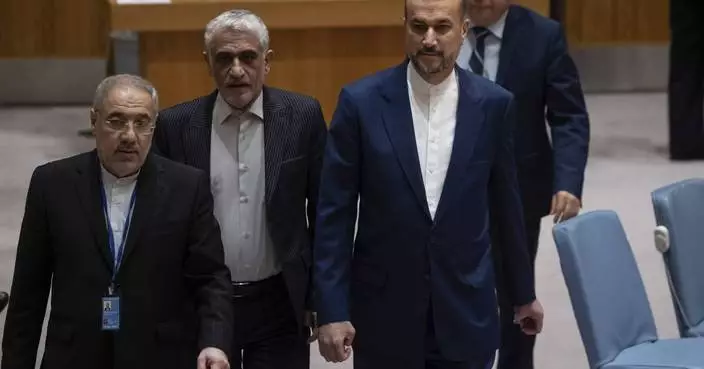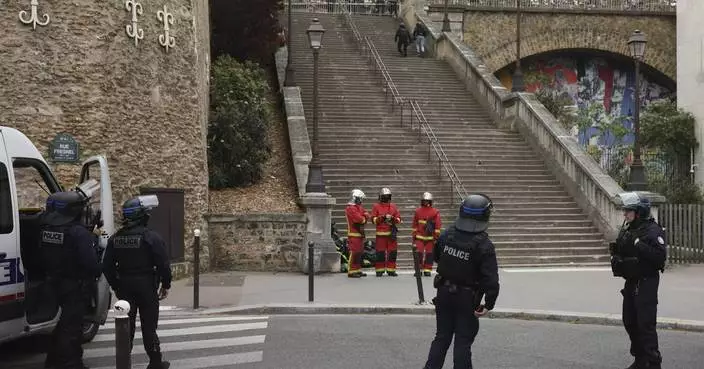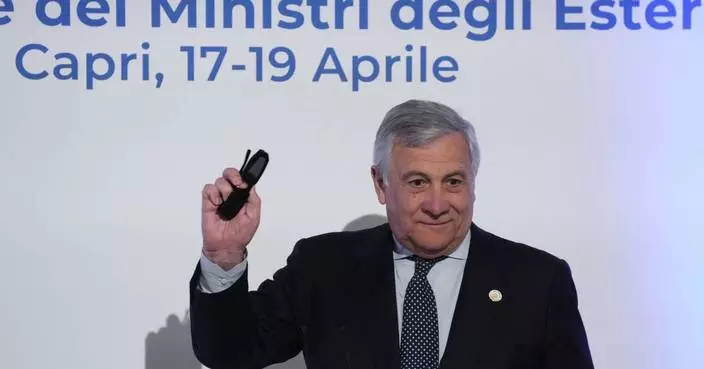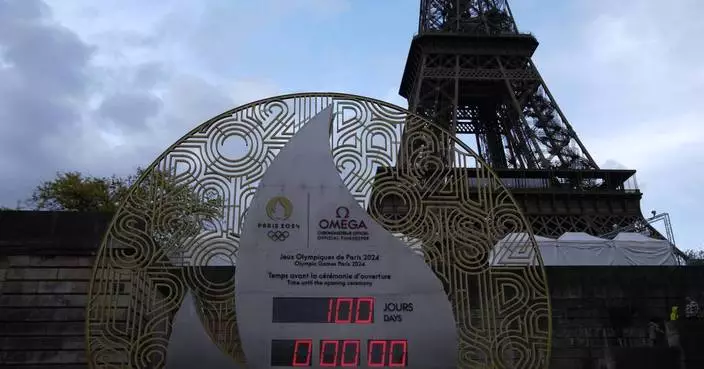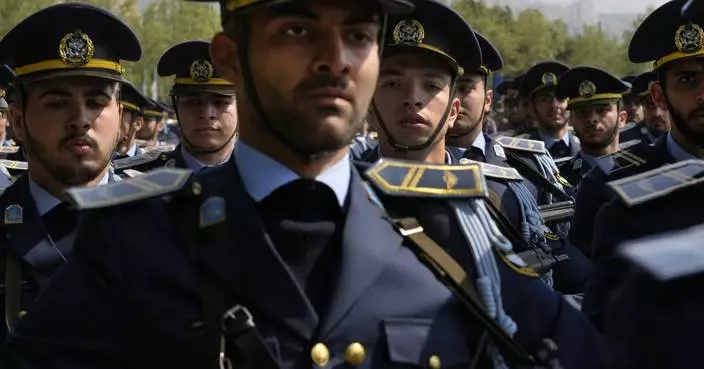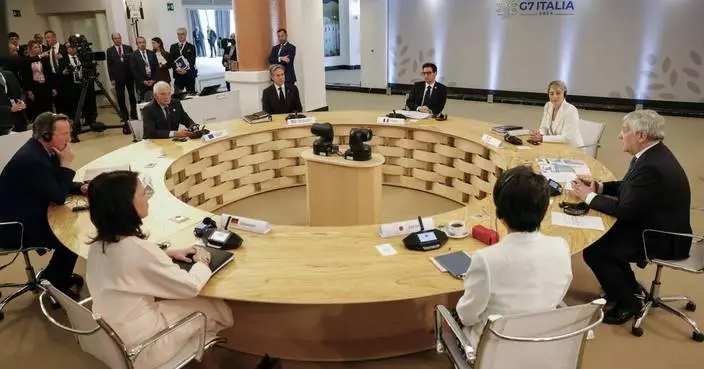For Iran, the so-called "Axis of Evil" has boiled down to a party of one, as President Donald Trump prepares for direct talks with North Korea.
With Saddam Hussein overthrown and Kim Jong Un now preparing for a planned meeting in Singapore with Trump, Iran remains the last renegade among former President George W. Bush's grouping of nations opposed to the U.S.
Click to Gallery
For Iran, the so-called "Axis of Evil" has boiled down to a party of one, as President Donald Trump prepares for direct talks with North Korea.
For those in Tehran, whether hard-liners, reformists or people simply trying to get by in Iran's worsening economy, it's head-spinning, especially after seeing Trump pull America out of the nuclear deal with world powers.
It wasn't supposed to be like this. Excited crowds flooded the streets after the 2015 nuclear deal that Iran struck with world powers, including the U.S. under President Barack Obama.
No one believed it would bring massive change to Iran, which remains a Shiite theocracy overseen by Supreme Leader Ayatollah Ali Khamenei. But many hoped it would encourage further negotiations and normalize Iran's relationships with the wider world.
Then came Trump, who campaigned pledging to tear up the nuclear deal. Once elected, he included Iran in his travel bans, blocking Iranians from traveling to the U.S., home to a large Iranian community.
But at the same time, Trump had traded his criticism of Kim Jong Un, a leader he once derided as "Little Rocket Man" on Twitter, for hopes of a one-on-one meeting.
Iran may have lost in the arrangement too. United Nations reports and Western countries say Pyongyang sold ballistic missile technology to Iran, helping it raise cash to avoid international sanctions. Iran has never acknowledged purchasing missile technology from North Korea, but hard-liners within Iran long have applauded Pyongyang's tough line against the U.S.
But since Kim agreed to talks with Trump, hard-liners have gone silent. Iran's President Hassan Rouhani, a relatively moderate cleric within the theocracy, always supported a diplomatic solution to end the state of war on the Korean Peninsula. However, Rouhani criticized the U.S. in November when Trump pursued negotiations with North Korea, calling the American leader untrustworthy.
A Tehran-based political analyst, Saeed Leilaz, said he believes any agreement between Trump and Kim will affect China, one of Iran's main outlets to the world. Trade between Iran and China was over $37 billion in 2017, 19 percent higher than the year before.
Already, Ali Akbar Velayati, a prominent foreign adviser to Khamenei, has suggested Iran turn toward the East.

A man walks through the old main bazaar in Tehran, Iran, Saturday, June 9, 2018. For Iran, the so-called “Axis of Evil” has become a lonely party of one as President Donald Trump prepares for direct talks with North Korea. (AP Photo/Vahid Salemi)
For those in Tehran, whether hard-liners, reformists or people simply trying to get by in Iran's worsening economy, it's head-spinning, especially after seeing Trump pull America out of the nuclear deal with world powers.
"I am buying my insulin shots at double the price only because of Trump's decision," fumed Najmeh Songhori, a 35-year-old diabetic mother of two standing in front of a pharmacy in central Tehran. "Meanwhile he is trying to reach a deal with North Korea. Who is going to trust him?"
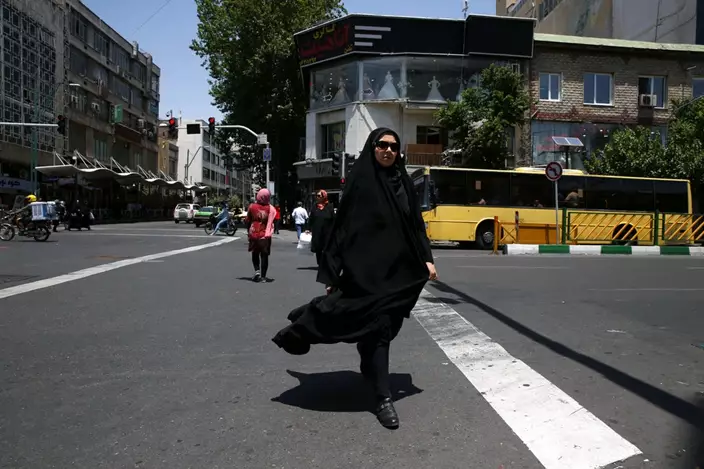
A woman crosses Jomhouri-e-Eslami (Islamic Republic) St. in downtown Tehran, Iran, Saturday, June 9, 2018. (AP Photo/Vahid Salemi)
It wasn't supposed to be like this. Excited crowds flooded the streets after the 2015 nuclear deal that Iran struck with world powers, including the U.S. under President Barack Obama.
The deal saw Iran agree to limit uranium enrichment in its nuclear program, which the West feared could be used to build a nuclear weapon. For Iran, which long has maintained its atomic program was for peaceful purposes, the deal took the shackles of sanctions off its economy and opened up its oil sales abroad.
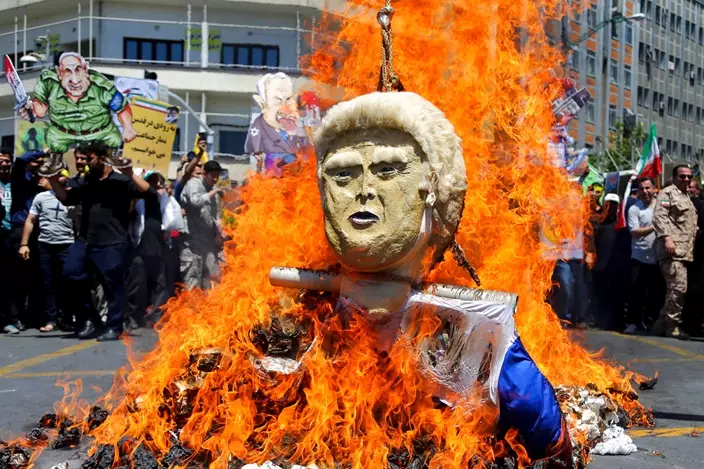
In this Friday, June 8, 2018, photo, an effigy of the U.S. President Donald Trump is set on fire during the annual anti-Israeli Al-Quds, Jerusalem, Day rally in Tehran, Iran. (AP Photo/Ebrahim Noroozi)
No one believed it would bring massive change to Iran, which remains a Shiite theocracy overseen by Supreme Leader Ayatollah Ali Khamenei. But many hoped it would encourage further negotiations and normalize Iran's relationships with the wider world.
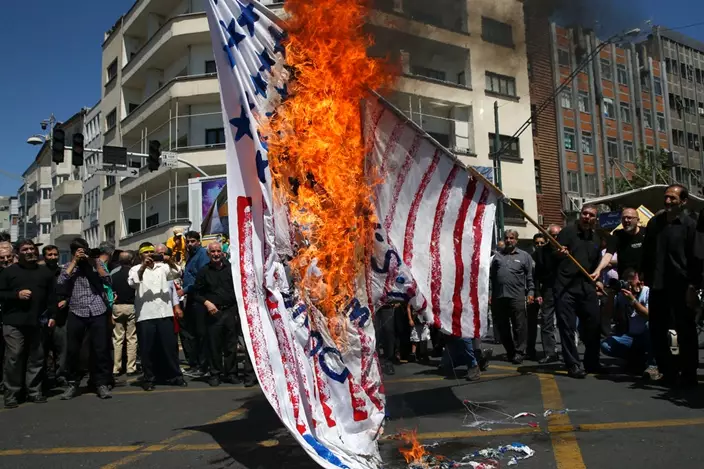
In this Friday, June 8, 2018, photo, Iranian protesters burn a representation of the U.S. flag in their annual anti-Israeli Al-Quds, Jerusalem, Day rally in Tehran, Iran. (AP Photo/Vahid Salemi)
Then came Trump, who campaigned pledging to tear up the nuclear deal. Once elected, he included Iran in his travel bans, blocking Iranians from traveling to the U.S., home to a large Iranian community.
Then on May 8, Trump followed through on his threat and pulled America out of the nuclear agreement, dooming billions of dollars of business deals, including Boeing sales.
"At the point when the United States had maximum leverage, this disastrous deal gave this regime — and it's a regime of great terror — many billions of dollars, some of it in actual cash — a great embarrassment to me as a citizen and to all citizens of the United States," Trump said then.

Vehicles drive on Jomhouri-e-Eslami (Islamic Republic) St. in downtown Tehran, Iran, Saturday, June 9, 2018. (AP Photo/Vahid Salemi)
But at the same time, Trump had traded his criticism of Kim Jong Un, a leader he once derided as "Little Rocket Man" on Twitter, for hopes of a one-on-one meeting.
"I think Trump lost the chance to work with Iran," said Mansour Ahmadpour, a 43-year-old taxi driver in downtown Tehran. "I learned in my life that leaving for another table is a sign of weakness when your partners are waiting for you."
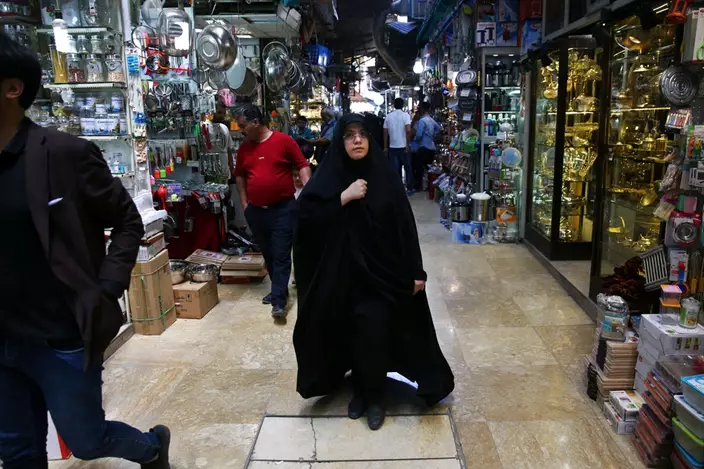
People walk through the old main bazaar in Tehran, Iran, Saturday, June 9, 2018. For Iran, the so-called “Axis of Evil” has become a lonely party of one as President Donald Trump prepares for direct talks with North Korea. (AP Photo/Vahid Salemi)
Iran may have lost in the arrangement too. United Nations reports and Western countries say Pyongyang sold ballistic missile technology to Iran, helping it raise cash to avoid international sanctions. Iran has never acknowledged purchasing missile technology from North Korea, but hard-liners within Iran long have applauded Pyongyang's tough line against the U.S.
"North Korea did not give a positive answer to the U.S. for negotiation," Iran's hard-line Kayhan daily newspaper wrote last August. "Without a doubt it is possible to say that North Korea learned from the fruitless and disastrous negotiations of Iran with the U.S. And it has not accepted to get itself into the curl of deceit of the U.S."
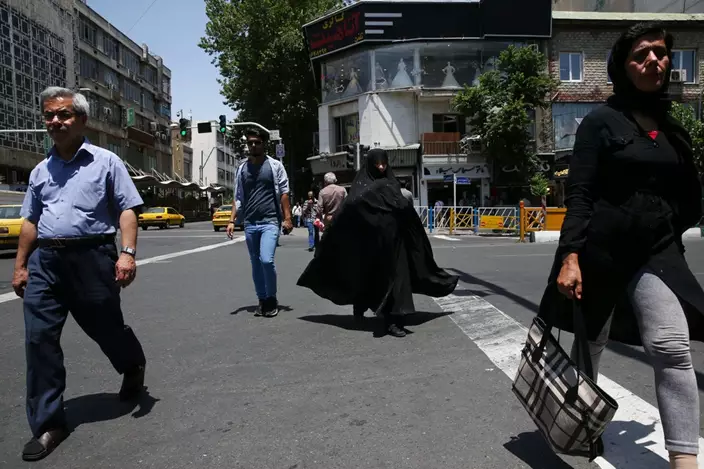
Iranian pedestrians cross Jomhouri-e-Eslami (Islamic Republic) St. in downtown Tehran, Iran, Saturday, June 9, 2018. (AP Photo/Vahid Salemi)
But since Kim agreed to talks with Trump, hard-liners have gone silent. Iran's President Hassan Rouhani, a relatively moderate cleric within the theocracy, always supported a diplomatic solution to end the state of war on the Korean Peninsula. However, Rouhani criticized the U.S. in November when Trump pursued negotiations with North Korea, calling the American leader untrustworthy.
"Americans are sending a message to some countries in eastern Asia to come and enter negotiations," Rouhani said. "Have they lost their minds to talk to you? You have already trampled on recent negotiations."
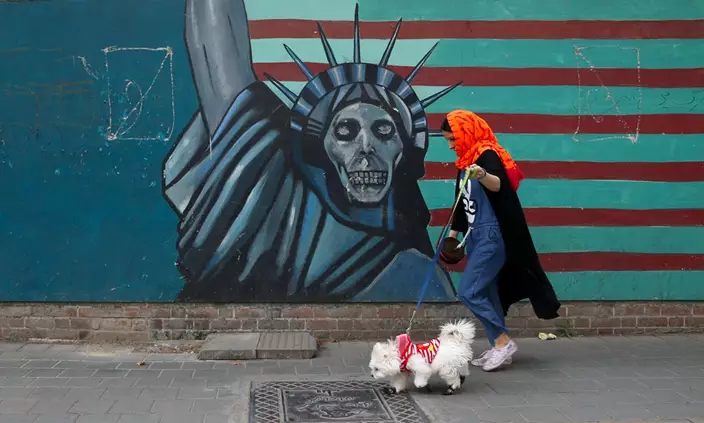
In this May 8, 2018, photo, a woman walks her dog past a satirical drawing of Statue of Liberty on the wall of the former U.S. Embassy in Tehran, Iran, Tuesday, May. 8, 2018. (AP Photo/Vahid Salemi)
A Tehran-based political analyst, Saeed Leilaz, said he believes any agreement between Trump and Kim will affect China, one of Iran's main outlets to the world. Trade between Iran and China was over $37 billion in 2017, 19 percent higher than the year before.
"If they reach an agreement, pressure on Iran will be increased," Leilaz said. "The agreement is a kind of deal between the U.S. and China, too."

People shop at the old main bazaar in Tehran, Iran, Saturday, June 9, 2018. (AP Photo/Vahid Salemi)
Already, Ali Akbar Velayati, a prominent foreign adviser to Khamenei, has suggested Iran turn toward the East.
"Our national interests are compatible with Russian and Chinese interests in many fields," he said.
Back on the street, Shahab Mousavi, a 29-year-old electrical engineer, said he worried the Trump-Kim talks meant only tougher times ahead.

Iranian merchants talk while waiting for customers at a carpet market in the old main bazaar in Tehran, Iran, Saturday, June 9, 2018. (AP Photo/Vahid Salemi)
"Surely, Trump will add pressure on Iran after reaching a deal with North Korea," Mousavi said. "We have no chance except resisting the U.S.' bullying policy."
Mohammad Rajabi, a 22-year-old engineering student at Tehran Azad University, offered another idea.
"I wish we were in negotiations with the U.S. instead of Kim," he said. "In a smart way, Kim turned the threat of war to talks. We could do that too."
JERUSALEM (AP) — Israel and Iran on Friday both played down an apparent Israeli airstrike near a major air base and nuclear site in central Iran, signaling the two bitter enemies are ready to prevent their latest eruption of violence from escalating into a full-blown regional war.
But the indecisive outcome of weeks of tensions — which included an alleged Israeli strike that killed two Iranian generals, an unprecedented Iranian missile barrage on Israel and the apparent Israeli strike early Friday in the heart of Iran — did little to resolve the deeper grievances between the foes and left the door open to further fighting.
“It appears we’re closer than ever to a broad regional war, despite the fact that the international community will most likely make a great effort to de-escalate tensions,” wrote Amos Harel, the military-affairs commentator for the Israeli daily Haaretz.
Israel has long considered Iran to be its greatest enemy — citing the Islamic Republic’s calls for Israel’s destruction, its controversial nuclear program and its support for hostile proxies across the Middle East.
These tensions have risen since Hamas and Islamic Jihad, Iranian-backed Palestinian groups, attacked Israel on Oct. 7, sparking a devastating Israeli offensive in Gaza that has continued for more than six months. Hezbollah, an Iranian-backed proxy in Lebanon, immediately began striking Israeli targets, opening up tit-for-tat fighting along a second front, while Iranian-backed militias in Iraq, Syria and Yemen have also fired missiles and drones at Israel throughout the war.
While Israel and Iran have waged a shadow war for years, mostly in neighboring Syria, they have largely avoided direct confrontations. That changed after an April 1 airstrike killed two Iranian generals at an Iranian diplomatic compound in the Syrian capital of Damascus. Although Israel did not comment, Iran blamed Israel for the strike and vowed revenge.
Iran responded with its first-ever direct attack on Israel, launching over 300 missiles and attack drones late Saturday night. Israel, working with a U.S.-led international coalition, said it intercepted 99% of the incoming fire, though a handful of missiles managed to land, causing minor damage to an Israeli military base and seriously wounding a young girl.
In Friday’s attack, Iranian state television said that air defense batteries fired in several provinces over reports of drones in the air. Iranian army commander Gen. Abdolrahim Mousavi said crews targeted several flying objects.
“The explosion this morning in the sky of Isfahan was related to the shooting of air defense systems at a suspicious object that did not cause any damage,” Mousavi said.
Authorities said air defenses fired at a major air base near Isfahan, which long has been home to Iran’s fleet of American-made F-14 Tomcats — purchased before the 1979 Islamic Revolution.
Isfahan also is home to sites associated with Iran’s nuclear program, including its underground Natanz enrichment site, which has been repeatedly targeted by suspected Israeli sabotage attacks. The apparent attack Friday came on Iranian Supreme Leader Ayatollah Ali Khamenei’s 85th birthday.
State television described all Iranian atomic sites in the areas as “fully safe.” The United Nations’ nuclear watchdog, the International Atomic Energy Agency, also said there was “no damage” to Iran’s nuclear sites.
Iranian officials made no mention of possible Israeli involvement. That could be intentional, particularly after Iranian officials for days have been threatening to respond to any Israeli retaliatory attack.
Israel also had no comment on the apparent attack, though one hard-line government minister, Itamar Ben-Gvir, hinted at his dissatisfaction, with a one-word tweet early Friday, using a slang word for weak or lame.
But Italy’s foreign minister, Antonio Tajani, said at a summit of Western leaders in Capri that the U.S. received “last-minute” information from Israel about the attack. U.S. Secretary of State Antony Blinken did not dispute that, but said: “We were not involved in any offensive operations.”
Yoel Guzansky, a former Iran expert in the Israeli prime minister’s office, said Israel appears to have carried out the attack to “check off a box” by sending a message to Iran without doing anything too provocative that could upset the United States, which had urged restraint, or spark further Iranian retaliation.
“It seems very limited, to send a message that ‘we can strike you inside of Iran,’” said Guzansky a senior researcher at the Institute for National Security Studies, a Tel Aviv think tank.
He said “the current round” of violence appears to be over, but that “nothing has changed” with Israel still facing Iranian-backed threats on various fronts.
“I see further rounds,” he said. And the next time, if Iran surprises Israel or allies don’t assist in Israel’s defense, “the outcome will be different.”
U.N. Secretary-General Antonio Gueterres called for an end to the strikes.
“It is high time to stop the dangerous cycle of retaliation in the Middle East,” his office said.
Charles Lister, a senior fellow at the Washington-based Middle East Institute and a longtime regional analyst, challenged Iran’s claims that drones carried out the attacks. It appears instead that a small number of Israeli aircraft flew from Israel over Syria — striking at least two southern Syria military bases that have air defense systems along the way, he said.
They then entered Iraqi airspace, from where they fired a small number of Blue Sparrow air-to-surface ballistic missiles, likely without ever entering Iranian airspace, Lister said.
Accounts of explosions over Iraq support that scenario, and so does debris from what appears to be the booster of an Israeli-made Blue Sparrow missile that Iraqi security found in a field outside Baghdad, Lister said.
“In other words, the Israelis would never have needed to enter Iranian airspace to conduct this attack,” Lister said. "I think this was Israel’s way of just sending a message that we can reach you anywhere we want.”
If this latest round subsides, Israel can now return its focus to its ongoing war in Gaza and the simmering fighting with Hezbollah. With neither of those fronts letting up, the risk of further run-ins with Iran remains high, though neither side appears eager after Friday's apparent Israeli attack.
“Neither side is ready to jump over the brink," said Alex Vatanka, director of the Iran program at the Middle East Institute. But he added a major caveat.
“Probably we’re going to go back to the proxy war, “ he said, but now it’s a proxy war with the risk of “that sudden eruption of state-to-state war. Which we didn’t have to worry about before.”
Gambrell reported from Dubai, United Arab Emirates. Associated Press journalists Nasser Karimi, Mehdi Fattahi and Amir Vahdat in Tehran, Iran; Bassem Mroue in Beirut; Ellen Knickmeyer in Washington; Qassim Abdul-Zahra in Baghdad; and Nicole Winfield in Capri, Italy; contributed to this report.
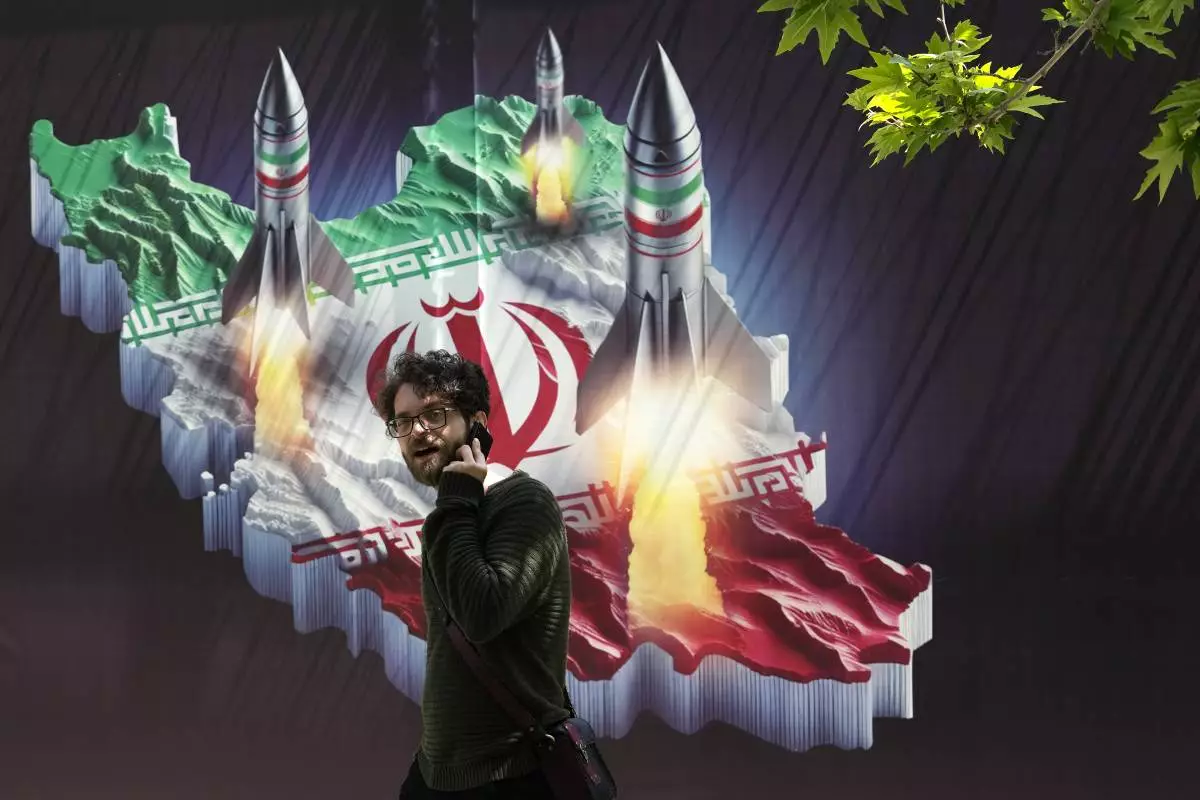
A passerby, taking on his cellphone, walks past a banner showing missiles being launched from Iranian map in northern Tehran, Iran, Friday, April 19, 2024. Iran fired air defenses at a major air base and a nuclear site near the central city of Isfahan after spotting drones early Friday morning, raising fears of a possible Israeli strike in retaliation for Tehran's unprecedented drone-and-missile assault on the country. (AP Photo/Vahid Salemi)
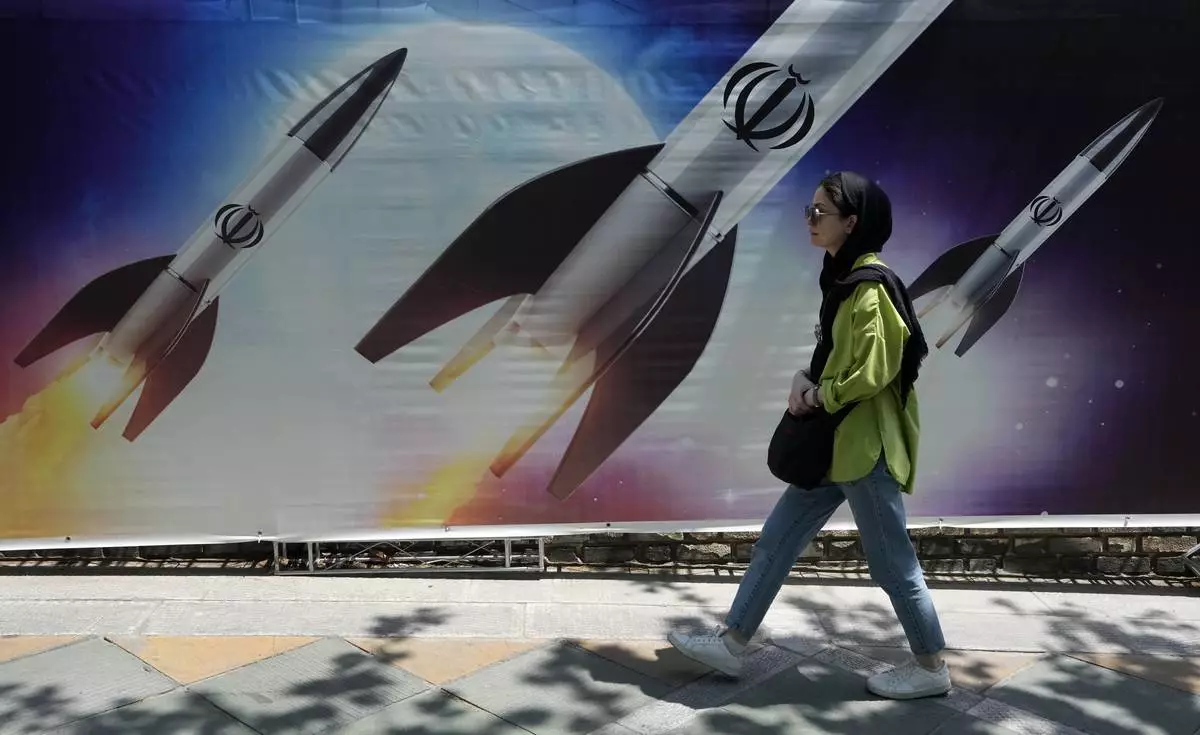
A woman walks past a banner showing missiles being launched, in northern Tehran, Iran, Friday, April 19, 2024. Iran fired air defenses at a major air base and a nuclear site near the central city of Isfahan after spotting drones early Friday morning, raising fears of a possible Israeli strike in retaliation for Tehran's unprecedented drone-and-missile assault on the country. On the missiles, a decorative sign reads: "Allah" (AP Photo/Vahid Salemi)
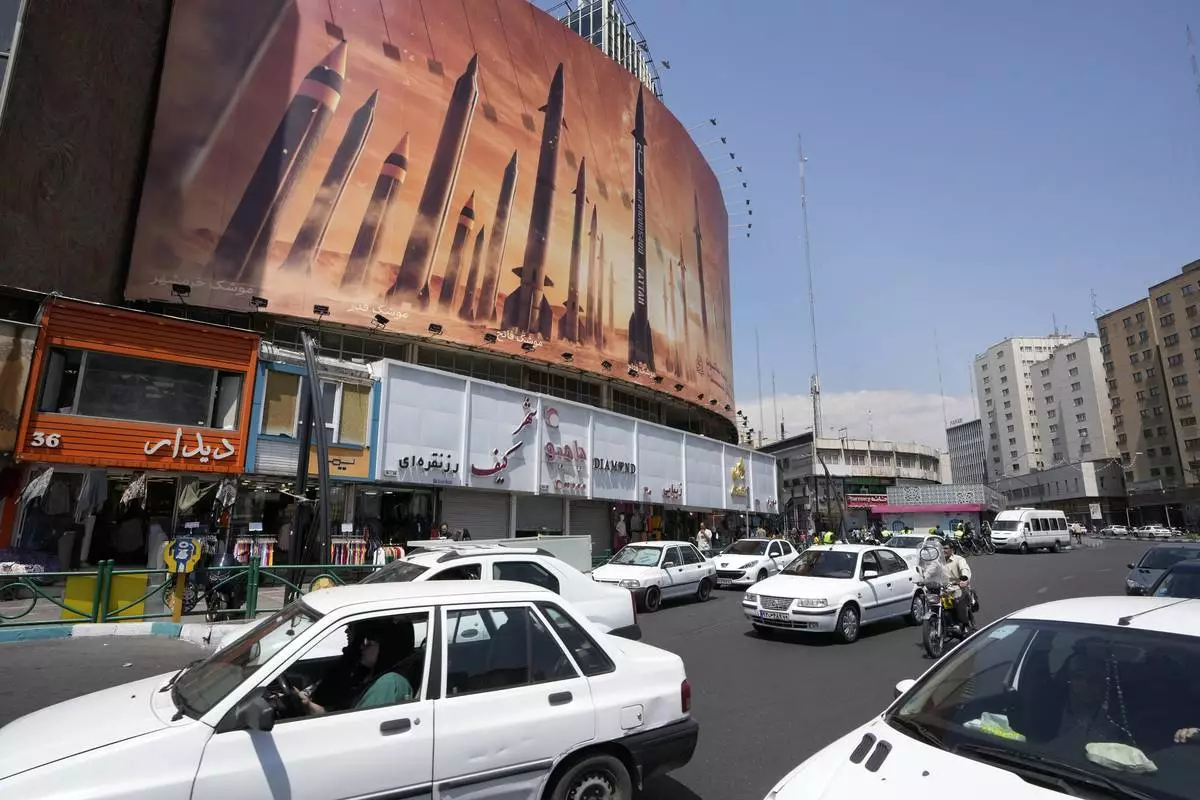
Vehicles drive past an anti-Israeli banner showing missiles being launched, in a square in downtown Tehran, Iran, Friday, April 19, 2024. Iran fired air defenses at a major air base and a nuclear site near the central city of Isfahan after spotting drones early Friday morning, raising fears of a possible Israeli strike in retaliation for Tehran's unprecedented drone-and-missile assault on the country. (AP Photo/Vahid Salemi)
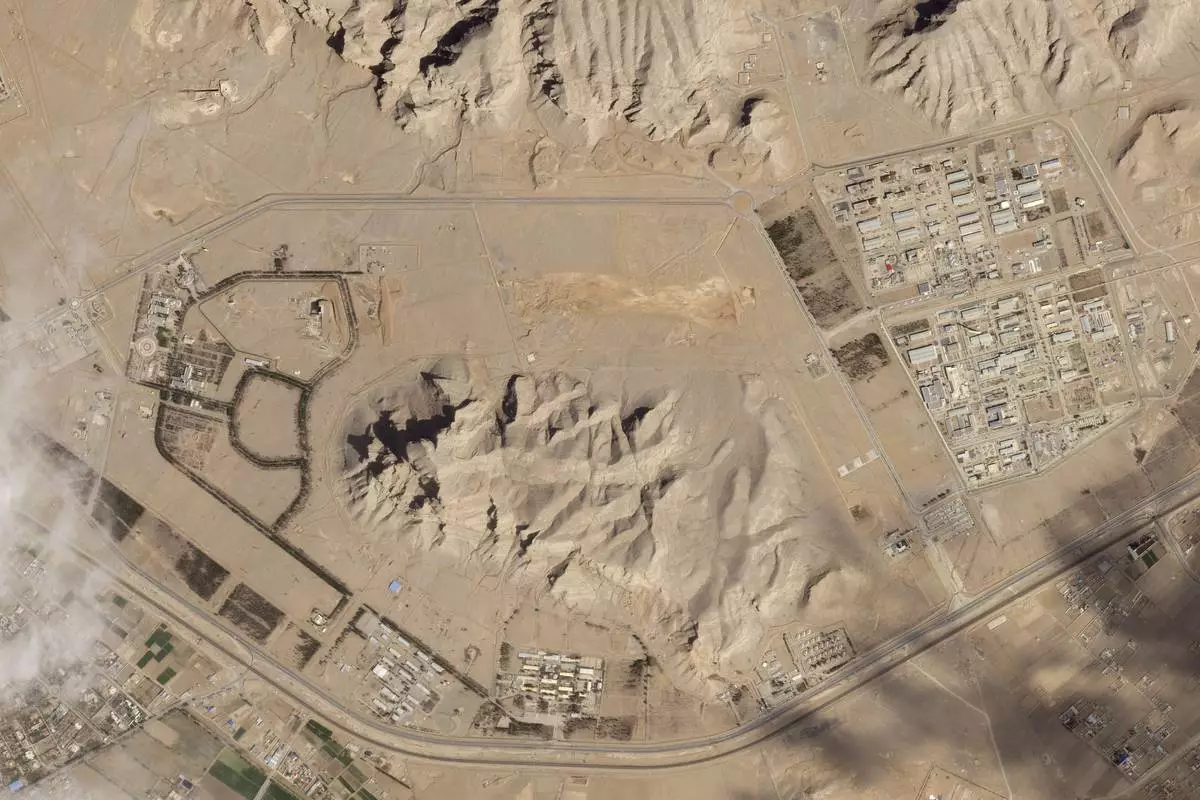
This satellite image from Planet Labs PBC shows Iran's nuclear site in Isfahan, Iran, April 4, 2024. Iran fired air defenses at a major air base and a nuclear site early Friday morning near the central city of Isfahan after spotting drones, which were suspected to be part of an Israeli attack in retaliation for Tehran's unprecedented drone-and-missile assault on the country. (Planet Labs PBC via AP)
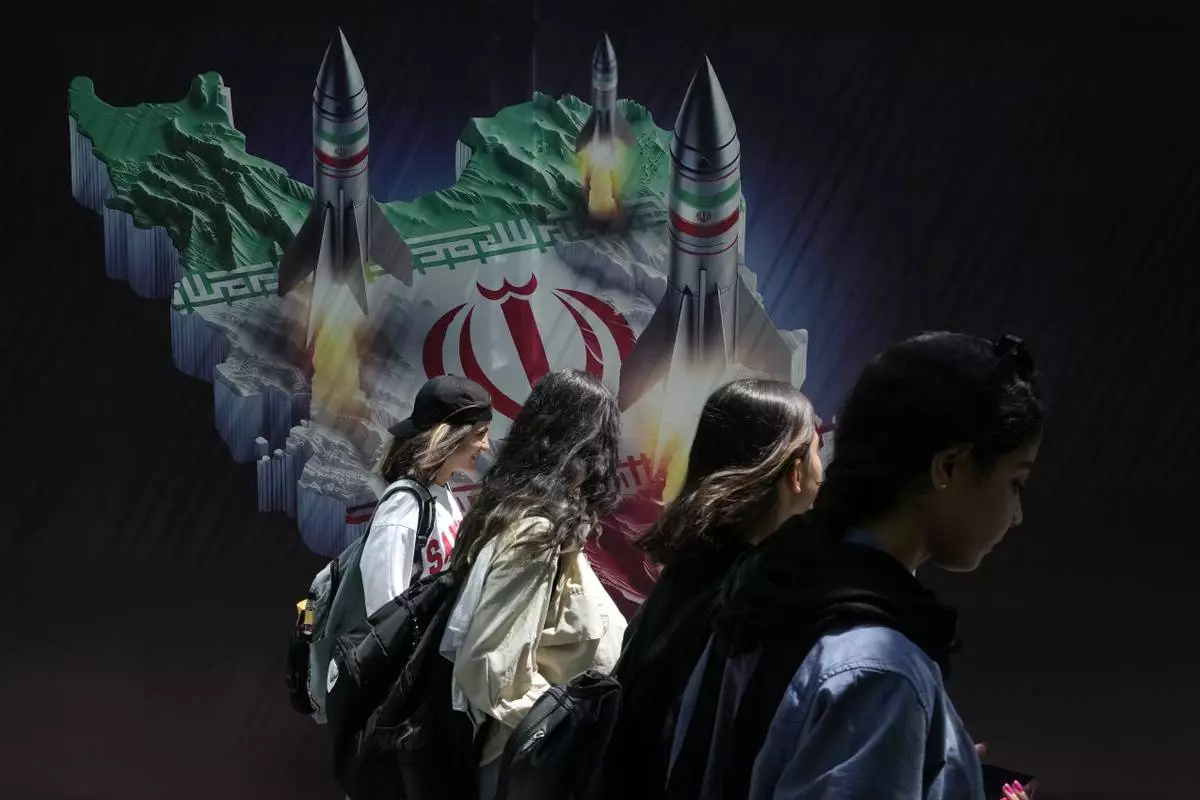
Iranian women without wearing their mandatory Islamic headscarf walk past a banner showing missiles being launched from Iranian map in northern Tehran, Iran, Friday, April 19, 2024. Iran fired air defenses at a major air base and a nuclear site near the central city of Isfahan after spotting drones early Friday morning, raising fears of a possible Israeli strike in retaliation for Tehran's unprecedented drone-and-missile assault on the country. (AP Photo/Vahid Salemi)


















